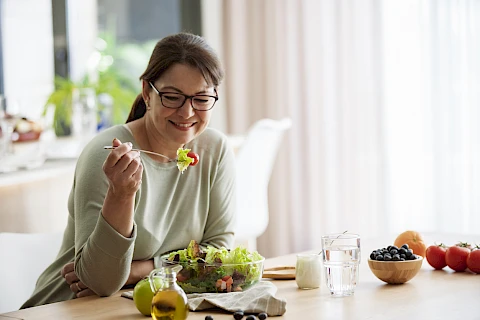
Eye health in seniors is a component of overall well-being and can significantly impact quality of life. One of the most effective ways to support healthy eyes and avoid age-related eye problems in older adults is through a nutritious diet. Discover how the right foods can promote eye health in seniors and get practical tips to incorporate these nutrients into daily meals.
Essential Vitamins and Minerals for Eye Health
Several vitamins and minerals play roles in maintaining eye health. Vitamin A promotes good vision. It helps maintain the surface of the eye and is crucial for low-light and color vision. Deficiency in vitamin A can lead to serious conditions like dry eyes, night blindness, and more severe issues like corneal ulcers. Sources of Vitamin A include carrots, sweet potatoes, and spinach
Vitamin C is a powerful antioxidant that helps protect the eyes from damage by free radicals. Antioxidants can delay the onset of cataracts and slow the progression of age-related macular degeneration (AMD). Sources of Vitamin C include oranges and strawberries. Zinc is necessary for overall eye health. It helps deliver vitamin A from the liver to the retina to produce melanin, a protective pigment in the eyes. Adequate zinc intake can reduce the risk of AMD and other eye-related issues.
Eye-Healthy Foods
A balanced diet rich in specific foods can support eye health in seniors. Leafy greens like spinach and kale are rich in both vitamins C and E, as well as lutein and zeaxanthin, antioxidants that reduce the risk of cataracts and AMD. You can add spinach to smoothies or sauté kale with garlic for a tasty side dish. Fish, particularly those rich in omega-3 fatty acids like salmon, tuna, and mackerel, are excellent for eye health. Omega-3 fatty acids help prevent dry eyes and reduce the risk of AMD. The best types of fish are wild-caught salmon, sardines, and mackerel.
Nuts and seeds are packed with vitamin E and healthy fats, which can help protect the eyes from age-related damage. Sprinkle chia seeds on yogurt, or include almonds in your salads. Citrus fruits like oranges, lemons, and grapefruits are high in vitamin C, which can help maintain the health of blood vessels in the eyes and may reduce the risk of cataracts. Drink a glass of fresh orange juice in the morning or add grapefruit slices to a salad.
Practical Tips for Caregivers
Incorporating these eye-healthy foods into a senior's diet doesn't have to be challenging. Plan meals that include a variety of the mentioned foods to ensure a balanced intake of vitamins and minerals. Start with small portions of new foods and pair them with familiar favorites to make the transition easier. You can use colorful fruits and vegetables to make meals more attractive and experiment with herbs and spices to enhance flavors without adding extra salt or sugar.
Need Help With Meal Planning and Prep?
Maintaining good eye health is essential, especially for seniors. A diet rich in specific vitamins and minerals can significantly support eye function and reduce the risk of age-related eye issues. Caregivers can play a role by incorporating eye-healthy foods into their loved ones' diets. Remember, small dietary changes can lead to significant health benefits. For personalized senior care services in Indianapolis, Carmel, and Brownsburg, contact Senior Helpers Indianapolis today.